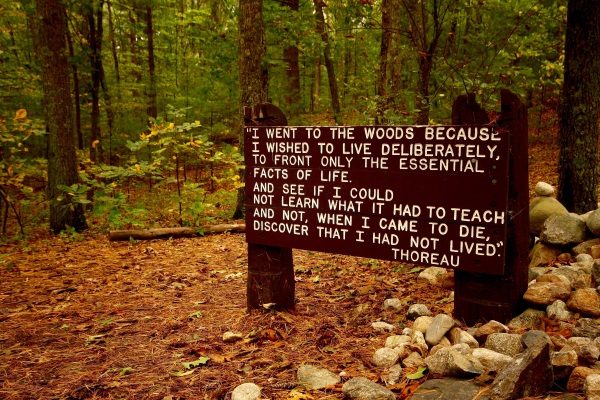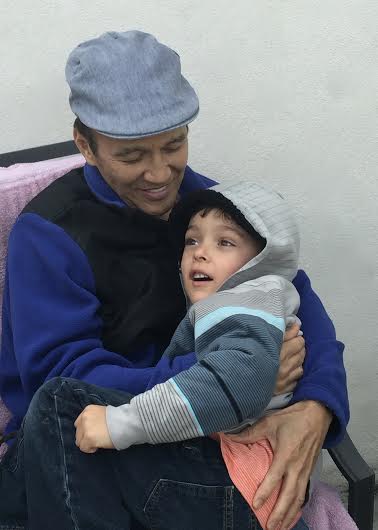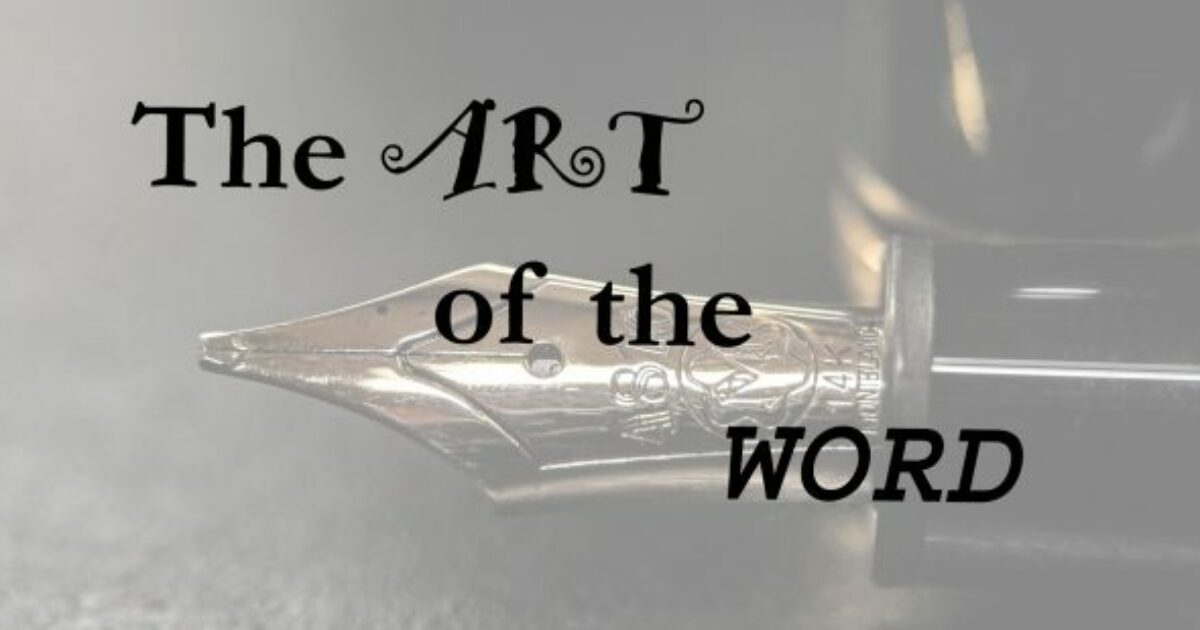Solitude, Simplicity, Silence
By S M Chen, posted 4/3/2017 “How many things there are that I do not want.” –Socrates, 470-399 B.C.E.
***
I recently encountered these lines by celebrated American poet Walt Whitman (1819-1892), liked them and decided to share on a social media website:
“Love the earth and sun and animals.
Despise riches; give alms to everyone that asks.
Stand up for the stupid and crazy.
Devote your income and labor to others…
And your very flesh shall be a great poem.”
Someone I don’t know well, from long ago, whose mother was my 6th grade teacher, responded: “If you devote all your income and labor to others, then you’ll definitely have to go be a hermit in the woods.”
I had no idea at the time where her thinking lay.
Until she added, a short time later in a subsequent post: “Read the new book about the Maine hermit – he was a strange poem. The Stranger in the Woods.”
This piqued my interest.
***
One of my favorite people has been Henry David Thoreau (1817-1862), whose Walden is considered a classic. I have, in silence and with reverence, walked the circumference of Walden Pond, where Thoreau built a cabin and lived alone for a time. A recount of his labors and contemplations (the two not unrelated) are to be found in Walden.

I’ve visited the Franciscan Serra Retreat in Malibu, CA, and always found its quietude and monastic simplicity appealing. In another life I think I might have found fulfillment as a monk.
***
One reason to have online friends is to learn.
I had not heard of Michael Finkel’s book. I found and read some excerpts from The Stranger in the Woods: The Extraordinary Story of the Last True Hermit, the true recount of Christopher Knight, who, in 1986 at age 20, drove his car to the edge of a Maine forest, tossed the car keys in the center console, and walked into the woods.
He spent the next 27 years alone. His sole word to a human during that self-enforced solitude was a “Hi” greeting to a hiker he encountered in the wild.
He survived, sometimes barely, in the outdoors, sleeping in a tent, regardless of the weather (Maine winters are notoriously harsh). Although he had some money (his wallet contained moldy $395 when he was finally apprehended), he periodically and with regularity purloined things, mainly food, from cabins in the environs. He would only take what he could carry, necessitating, at times, multiple trips. Over 40 homes were broken into more than 1000 times.
In 2013 he pled guilty to 13 counts of burglary and theft and completed a 7-month jail sentence as part of a plea agreement. Even the prosecutor agreed a longer sentence would be cruel in this instance.
Michael Finkel, the author, initiated correspondence with Knight and later visited him multiple times in prison. Knight’s family refused contact with Finkel, and Knight himself did not maintain contact once he was released from incarceration. He also does not benefit financially from sales of Finkel’s book.
***
In reading excerpts from the book, I was struck by the use of the same two words by both Christopher Knight and Walt Whitman. Knight says some of his fellow inmates considered him “stupid” and “crazy” when he tried to initiate conversation by speaking of the synchronicity of the summer solstice and super moon. Whitman uses those same words as nouns in the brief poem with which I open this essay.
But Knight is neither.
Certainly not stupid. Based on his spare comments and observations, his intelligence is above average, likely superior.
And crazy? No one, including the author and the many into whose cabins Knight broke, thought so. An unusual introvert, he yet resides under a small part of the Bell curve of normalcy.
***
Spelunkers have a credo:
“Take only pictures
Leave only footprints
Kill only time”
Of the three, only the last (perhaps) applied to Knight.
He took no photos, made no sketches, kept no diary or journal. It’s as if, upon his passing – which he hoped to be in solitude – all memory of his life in the woods would vanish and be less tangible than his corpus, which might be discovered by humans. Alone, he would not be able to exit life without a trace of his having been here.
He took pains to avoid leaving footprints, particularly in the wintertime. His limited travels were only at night and he never lit a campfire for fear of discovery.
For those of you interested in this story but disinclined to procure the book, here is a link to an article (which preceded the book) by Finkel which is free and can be more quickly read than the book:
***
I do not condone Knight’s thievery. Neither did he. He admitted he was not raised to steal.
Though he stole magazines and books and other things as well as food, he never stole a Bible; perhaps he should have. He also never harmed anyone (or any creature, that we know of). Did not carry a weapon. Never broke a window or left a door off its hinges.
I do not consider his life, to date, a great poem, as defined by Whitman. Or necessarily poetry at all. But his life is not yet over, so it is too early to say.
These words by Fyodor Dostoevsky (1821-1881), taken from Notes from Underground, included in Finkel’s book, may apply to Knight: “I have only in my life carried to an extreme what you have not dared to carry half-way, and what’s more, you have taken your cowardice for good sense, and have found comfort in deceiving yourselves. So that perhaps, after all, there is more life in me than in you.”
Or this, by writer Paulo Coelho (1947-): “Blessed are those who do not fear solitude, who are not afraid of their own company, who are not always desperately looking for something to do, something to amuse themselves with, something to judge.”
***
I do not think this quote (also in Finkel’s book) by American essayist William Deresiewicz (1964-) necessarily applies to Knight: “No real excellence, personal or social, artistic, philosophical, scientific, or moral, can arise without solitude.” Unless he was seeking personal excellence on terms unfamiliar to most of us.
I do like this, however, by Thomas Merton (1915-1968), Trappist monk, who wrote that nothing can be written about solitude “that has not already been said better by the wind in the pine trees.” This appears to have been recognized and acknowledged by Knight.
What about God? Did Knight find Him? It appears he did not search for God and, therefore, even at times of extremis, did not find Him. On the other hand, who can argue that, but for the sustaining power of the Almighty, Knight would not have survived 27 years in the wild?
***
Abraham Lincoln (1809-1865), one of our greatest Presidents, counseled: “Better to remain silent and be thought a fool than speak out and remove all doubt.”
It seems to me that much more mischief has been perpetrated by saying too much than too little.
For, when all is said and done, much more is said than done.
***
I find it of interest that several figures in Holy Writ experienced solitude. That solitude seems a precursor to what was to follow.
The life of Moses can be considered tripartite. His first 40 years were spent in Egypt, the next 40 tending flock in Midian (largely alone), and the last 40 leading the Hebrews in quest of the Promised Land. His middle third likely helped prepare him for the latter, more eventful third. Despite the necessity for his brother Aaron’s assistance, Moses’ slowness of speech may have been a virtue.
Elijah seemed to be alone a shorter time, but still years, when he hid at the brook Cherith during a time of national drought and was fed by ravens twice daily. That time alone appeared to help prepare him for subsequent confrontation with the 450 prophets of a false god.
David, when he tended flock and rescued sheep from a bear and a lion, was almost certainly largely devoid of human company. Those encounters gave him the skill and confidence to confront the best the Philistines had to offer in subsequent confrontation with Goliath.
John, the only disciple to escape a violent death (being cast into a vat of boiling oil is hardly nonviolent, but he did not perish), penned the revelatory last book of Holy Writ while banished to the Isle of Patmos, away from the exigencies of everyday life.
***
And then there was Christ.
Although He intermingled with those whose conceptions were more maculate than His own, His renewal came in solitude, when He could best commune with His father, which He, at times, spent all night doing.
There were times when His silence seemed deafening.
This is particularly true of His last days, pre-crucifixion. It was as if He knew that anything He said would be held against Him.
His words would be distorted, twisted as the thorns in the crown thrust upon His head, if necessary, by enemies whose blood lust would only be sated by His annihilation.
The Jews chose to save the life of an impenitent thief, Barabbas, rather than that of an innocent man, and dared the winds of fate to blow: “His blood be upon us.” Unable to look down the long corridors of the future, they could not have predicted the force of its winds or from which direction they would come.
Their vision clouded by demonic fury, they did not see (or chose to ignore) what they were doing. Is this not why He cried out, after He had been hoisted aloft, “Father, forgive them, for they know not what they do”?
Were they forgiven?
Unless they asked, I doubt it. And I suspect few asked.
***
Solitude. Simplicity. Silence. These three. It is hard to fault them. But perhaps the greatest of these is silence.
 S M Chen lives and writes in California.
S M Chen lives and writes in California.




